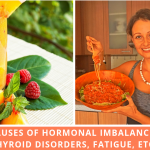If you have been diagnosed with Hashimoto thyroid disease, you’ve probably been told by your doctor that it’s an irreversible chronic disease.
The good news, however, there are a lot of things you can do to improve or reverse Hashimoto’s Thyroiditis.
Hashimoto or Hashimoto’s Thyroiditis, affects 14 million people in the United States alone, making it the most common thyroid disorder in America.
The American Thyroid Association reports that one in eight women in the United States is impacted by a thyroid disorder at some point during their lifetime.
Hashimoto thyroid disease is an autoimmune disorder.
This means the immune system is producing antibodies that are affecting the body’s own healthy tissues, which negatively impacts upon your thyroid gland functioning.
If you have Hashimoto thyroid disease, you are at a higher risk of developing other autoimmune disorders and, to a lesser extent, a specific form of thyroid cancer.
Other autoimmune diseases that can happen to someone already suffering with Hashimoto’s thyroid disease include Lupus, MS, type 1 diabetes and Addison’s disease, which can result in an adrenal crisis and damage adrenal glands.
I talk about the steps to reverse Hashimoto’s naturally in this video:
Hypothyroidism vs Hashimoto thyroid disease
You might be wondering: what’s the difference between Hashimoto disease and hypothyroidism?
Hypothyroidism is when the thyroid is under active.
This can happen with the disease called Hashimoto’s thyroid disease if it goes on for too long.
In the case of Hashimoto, antibodies attack proteins in the thyroid gland, causing gradual destruction of the thyroid gland itself.
This then results in reduced production of thyroid hormones.
Hypothyroidism means that the thyroid gland is not producing enough thyroid hormone. Hashimoto’s disease is the most common cause of hypothyroidism.
Symptoms of Hashimoto thyroid disease
Here are just some of the symptoms that you can experience due to having this condition:
- Fatigue and sluggishness
- Increased sensitivity to cold
- Low libido
- Constipation
- Pale, dry skin
- A puffy face
- Hair loss
- Hoarse voice
- Unexplained weight gain
- Muscle aches, tenderness and stiffness
- Excessive or prolonged menstrual bleeding (menorrhagia)
- Depression and anxiety.
- Insulin resistance
- Infertility
You definitely should not ignore a high level of thyroid antibodies and you can actually reverse them through diet and lifestyle changes.
![]()
Reversing Hashimoto thyroid disease
Step 1:
Dis-ease is an opportunity for you to start paying close attention to yourself with self-nurturing so you can experience greater mind-body-spirit harmony with yourself.
So it’s your opportunity to pay attention to the areas of your life that are not working – including your diet, overall lifestyle, thoughts, etc.
Going deep within for re-evaluation and deeper inner connection is an important first step in addressing any disease.
Step 2:
A big percentage of your symptoms can be reversed by diet and lifestyle changes.
In order to reverse Hashimoto’s thyroid disease, you’ll need to exclude the foods that trigger this condition and include the foods that help your body re-balance itself.
Some of the trigger foods include eggs, dairy and gluten.
The foods that can help you restore the functioning of your thyroid include whole plant foods – fresh fruits and vegetables and modest amounts of plant fats.
These foods will aid you in natural detoxification and health restoration, including restoration of your liver and your gut.
Step 3:
Address underlying deficiencies, which might include vitamin B12, vitamin D, selenium and iron.
These nutrients are often found to be low in ladies with hypothyroidism and Hashimoto’s, so if you are deficient in anything then it’s very important to correct it.
Step 4:
Address other reasons behind you having Hashimoto’s thyroid disease, including bad bacterial overgrowth, parasites and viruses.
Epstein Barr Virus, for example, that can often been found in people with Hashimoto’s thyroid disease and can actually lead to an autoimmune response to your thyroid gland.
Candida, SIBO (small intestine bacterial overgrowth), H-Pylori and other conditions can also be causing Hashimoto.
Step 5:
In order to reverse Hashimoto’s, you also need to balance the health of your gut.
Issues like a leaky gut, candida overgrowth, parasites, other pathogens can cause a lot of damage to your gut.
It’s very important to restore your digestive health as part of your hormonal restoration.
So these are the vital steps that you need to take to help balance your Hashimoto’s thyroid disease naturally.
Right Hypothyroidism Diet – Hashimoto, Thyroid Health
If you’ve been diagnosed with thyroid issues, what’s the best diet for hypothyroidism that also works with Hashimoto’s?
If you start looking around and research diets for hypothyroidism or Hashimoto’s, no doubt you’ll come across the Keto and Paleo diets.
Suffering with thyroid problems can have a huge impact on your health and overall lifestyle because it is such a central part of your health.
If your thyroid is failing to produce enough of the hormones that your body requires, you can then start experiencing low functioning thyroid symptoms, such as:
- weight gain
- intolerance to the cold
- low energy levels
- weakness
- hair loss
- mood issues, even depression
- loss of libido
From my own personal experience, I can testify that suffering with thyroid problems can literally turn your life upside down.
Some people even say that they didn’t know what real fatigue felt like until they had a thyroid problem and I can definitely vouch for this too.
So what’s the best hypothyroidism diet to help you deal with your issues?
It’s not a high fat diet, like many people are led to believe!
The problem is that eating high fat and greatly limiting your carb intake can harm the health of your thyroid gland.
Research has shown us that going low carb can affect the thyroid gland by:
- A drop in metabolic rate and energy production (1)
- Causing a fall in the active thyroid T3 thyroid hormone (2)
- Raising the thyroid blocking Reverse T3 hormone levels (2)
All of these suppress your thyroid function and so negatively affect your overall health, and of course the health of your thyroid gland.
Further to this, studies have shown that plant diets are associated with reduced risk of thyroid issues.
Diets that contained animal products or omnivore diets were associate with an increased risk of hypothyroidism.
Thyroid And Weight Loss
If your thyroid gland is sluggish and not producing enough hormones, then you will almost certainly notice that you put on weight very easily and keep it on.
And if this isn’t bad enough, then you will almost certainly have to deal with some or even all of the other unwanted symptoms that go along with hypothyroidism and Hashimoto’s, including weight gain, fatigue and brain fog.
Yes, and with all these symptoms inevitably comes a lower emotional state. Anxiety, depression and typically a big sense of frustration is something that many people start to experience.
Your clothes are now tight to put on or don’t fit at all.
You have little or no energy, don’t feel like exercising and as a result of less movement, you put on more weight. It’s a vicious circle.
So what can you do about thyroid and weight loss? How can you balance your hormones, lose that troublesome excess weight and keep it off long-term?
Here are the essential steps you need to make in order to help you achieve weight loss with hypothyroidism or Hashimoto’s.
1: Metabolism
Having a lower metabolic rate or slower metabolism with hypothyroidism or Hashimoto happens because your body does not have enough thyroid hormones.
This then causes weight gain, because you are basically not burning as many calories as you did when things were working properly.
So when it comes to thyroid and weight loss, improving your metabolism is essential.
2: Diet for hypothyroidism and Hashimoto’s
A sub-optimal diet is not going to benefit your thyroid health.
In fact, it has been shown for example that not getting enough carbohydrates in your diet will negatively affect your thyroid health.
So high carbohydrate diet that comes from healthy whole plant foods is very important.
The results we get with our clients who have many different thyroid issues is excellent.
They reduce or come off medication (or feel amazing on medication), they lose weight, feel more energy and start to live their live to the full.
![]()
3: Gut health
There are 100 trillion bacteria in your gut and these have a huge impact upon your health, including your hormone levels and your weight.
If your gut is out of balance and you experience poor digestion, constipation, gas or bloating, then you MUST address the health of your gut.
Your gut health will be affected by conditions like SIBO, IBS, IBD, parasites, leaky gut, Candida (yeast) and other imbalances.
A low thyroid is known to cause low stomach acid and negatively affect the movement of food through your gut as well.
4: Adrenal health
When you suffer with a low functioning thyroid, this can negatively impact your adrenal glands.
Your adrenal gland have to increase their output of hormones to make up for your poor thyroid health and lack of energy.
Things to consider:
· Switching to adrenal restoration nutrition plan
· Reducing overall stress level
· Exercising within your capability
· Getting enough quality sleep
· Correcting gut health issues, improving your liver health and overall health
So if you can start implementing these steps then you can start reversing your poor functioning thyroid, balance your hormone levels properly and lose that excess weight you have longed to do for so long.
Watch my video above to discover more about the steps you need to take.
Ready for your big health leap? We’re excited to invite you to our FREE online training.
During this masterclass, we’ll walk you through the 5 steps our clients use to overcome hormonal and other health imbalances and release 10-50 lbs of excess weight … whilst never restricting themselves of carbohydrates and sugar.
References:
-
https://www.endocrineweb.com/conditions/hashimotos-thyroiditis/hashimotos-thyroiditis-facts-tips
-
https://www.niddk.nih.gov/health-information/endocrine-diseases/adrenal-insufficiency-addisons-disease
-
https://www.ncbi.nlm.nih.gov/pubmed/6761185
-
https://www.ncbi.nlm.nih.gov/pubmed/3740086








